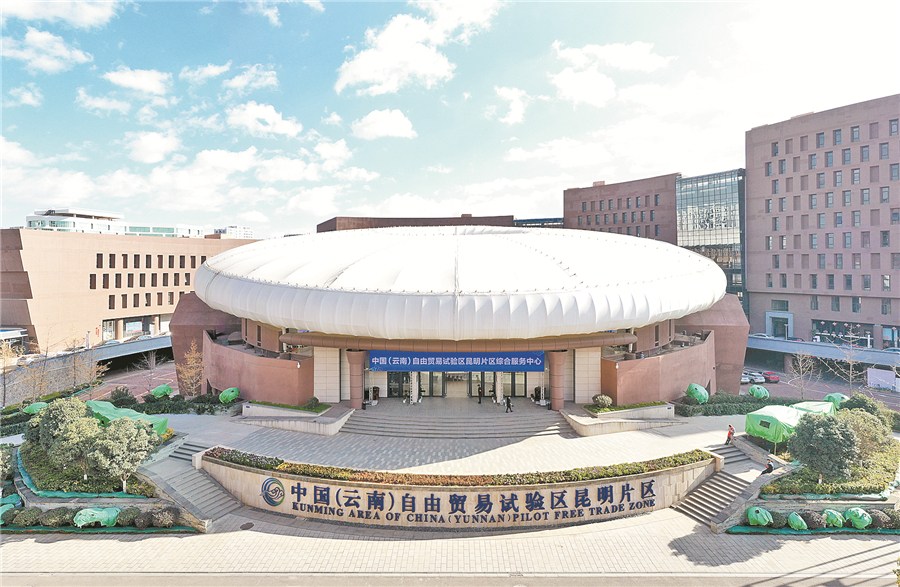One year on, SW China's pilot FTZ forges ahead despite pandemic

Every morning, trucks carrying dozens of tonnes of crabs and other aquatic products rumble from Myanmar through Wanding Port to a bustling Chinese fish market nearby, where the products are packed and transported to seafood lovers across China.
"The imports of aquatic products were heavily affected when the COVID-19 epidemic befell early this year, but the past few months have seen a strong rebound," said Yan Kot Che, a Myanmar seafood wholesaler at the market, located in the Dehong Dai and Jingpo Autonomous Prefecture, southwest China's Yunnan Province.
The prefecture is part of the Yunnan pilot free trade zone (FTZ) inaugurated on Aug. 30 last year to facilitate trade, investment and logistics between Yunnan and neighboring Myanmar, Vietnam and Laos. The FTZ also covers parts of Kunming, the provincial capital, and Honghe Hani and Yi Autonomous Prefecture.Yan Kot Che said his business has grown since the launch of the FTZ, thanks to improved customs clearance capacity and efficiency at Wanding Port. The monthly turnover of his business now stands at around 9 million yuan (1.3 million U.S. dollars).
Customs data showed that with streamlined customs clearance procedures, imports and exports at Wanding Port from January to July this year reached 372 million U.S. dollars, surging 72.6 percent year on year.
The busy land port exhibits the robust growth of Yunnan pilot FTZ over the past year. As of Aug. 27, the FTZ registered a foreign trade volume of 13.1 billion yuan, with its imports topping 7 billion yuan, according to official data.
The rapid development of cross-border e-commerce has also contributed to the FTZ's strong trade performance.
Li Jianrong, general manager of an e-commerce company in Honghe, said his company can deliver up to 3,000 parcels, mainly consignments of garments, shoes and bags, to Vietnamese customers every day in the peak season.
Li's company is located in the China-ASEAN cross-border e-commerce logistics park in Honghe's Hekou County, which sits next to Vietnam's Lao Cai. The park, officially launched in January, is now home to 130 e-commerce companies.
"Cross-border e-commerce improves logistic efficiency and saves time," Li said. "Vietnamese customers can place orders on popular local shopping sites like Lazada and Shopee. It takes only one day to transport our goods from Hekou to Hanoi, and at most three days to reach Ho Chi Minh City."
"This is a far cry from the days when traders used tricycles to transport cargo for customs clearance at Hekou Port. It could take them several hours just to cross the border," Li recalled.
Besides a robust growth in foreign trade, the Yunnan pilot FTZ has also become a magnet for domestic and foreign investment since its inauguration. The FTZ has rolled out a spate of preferential policies, including rent reduction, to attract investment.
As of July 30, a total of 13,902 newly-registered enterprises had been set up in the FTZ, including 64 foreign-funded enterprises. Many of the new enterprises are engaged in key fields such as high-end manufacturing, bio-industry, aviation logistics and the digital economy.
The Kunming sub-area of the FTZ alone has seen the establishment of 44 foreign-funded enterprises with a combined registered capital of 310 million U.S. dollars.
"The construction of the pilot FTZ has injected new vitality to Yunnan's high-quality development and opening-up," said Zhao Ruijun, head of the Yunnan provincial department of commerce.
Zhao added that the FTZ will work to attract more resources and continue to tap into domestic and international markets, helping Yunnan build itself into China's gateway to South Asia and Southeast Asia.
Photo by Zhang Tong